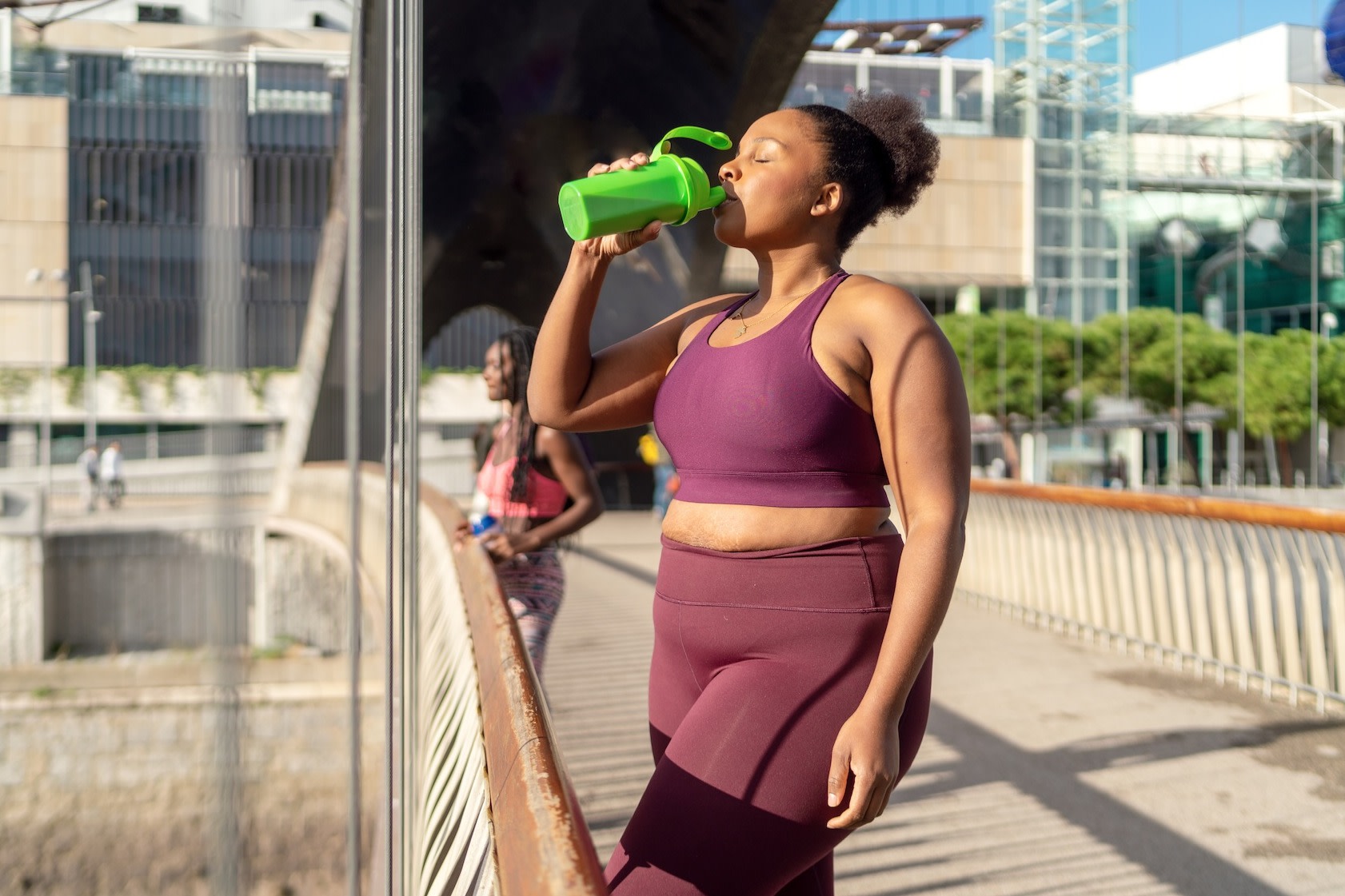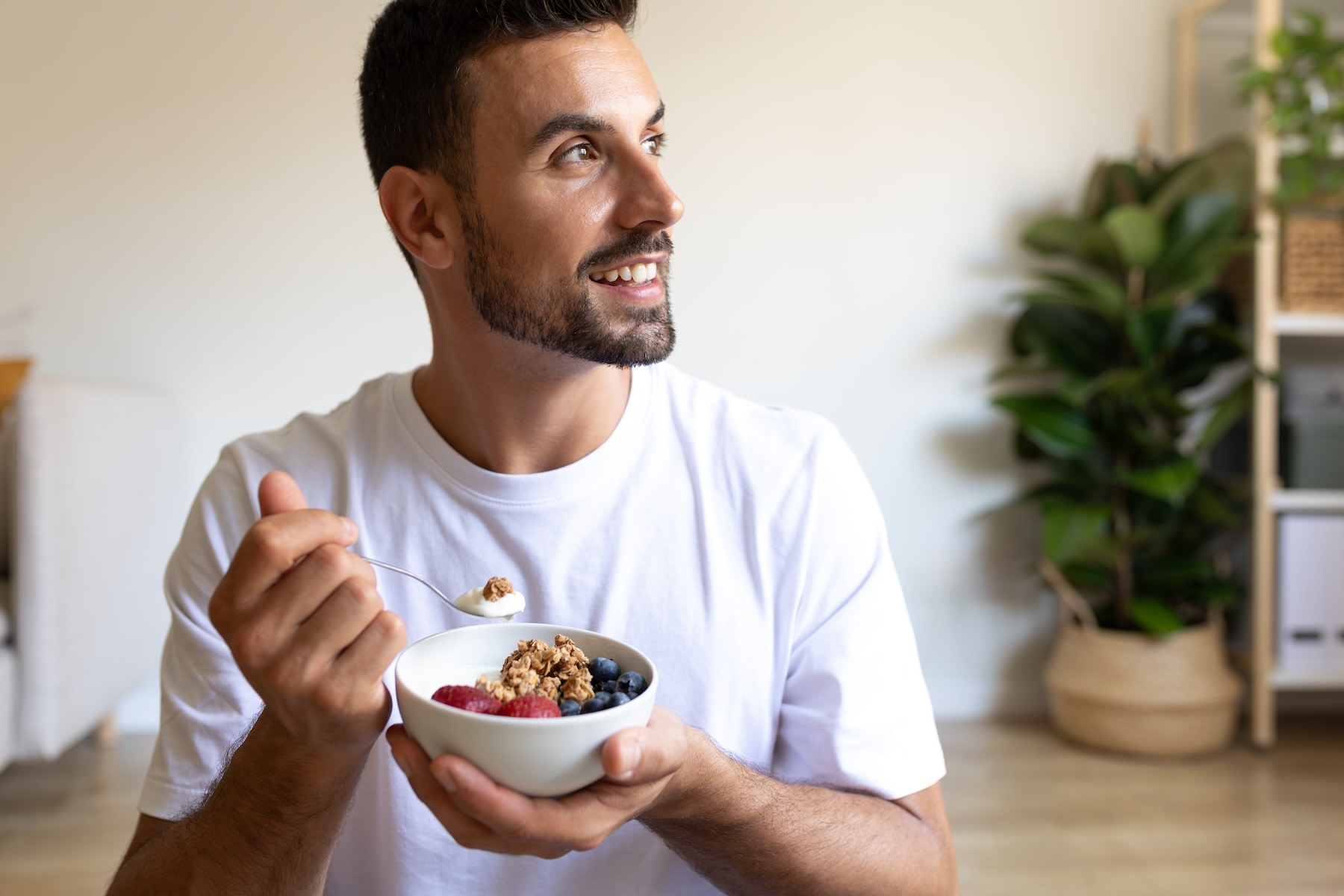
Aydan Metev / Moment via Getty Images
Should You Have Protein After Cardio? Sports Dietitians Break It Down
Just because you’re not lifting weights doesn’t mean you don’t need protein.
By Hillary Hoffower•
Do You Need Protein After Cardio?
Benefits of Consuming Protein After a Cardio Workout
How Soon Should You Have Protein After Cardio?
Post-Cardio Protein Ideas
The Takeaway
We all know the drill: finish a strength workout, eat some protein. The connection between lifting weights and replenishing with protein has become a gold standard in fitness culture, with good reason—protein has a bold reputation as one of the best foods for muscle recovery.
But what about after training sessions that don’t involve strength work? When it comes to logging miles on the treadmill or sweating through an indoor cycling class, do you really need to refuel with protein after cardio? Or is, say, a banana and some water enough?
Below, registered dietitians break down just how much your body actually needs protein after a cardio workout, and how you should incorporate it into your post-sweat nutrition plan.
Do You Need Protein After Cardio?
After a cardio workout, it’s generally a good idea to eat both protein and carbs for optimal recovery, according to Allison Knott, RDN, a sports dietitian with Anew Well Nutrition. That said, the protein part of the equation is a little less important after shorter or lower-intensity cardio workouts.
For example, a very intense or long cardio workout, such as a long marathon-training run, will create more damage to the muscle compared to an easy jog or walk, says sports dietitian Roxana Ehsani, RD. And any time our muscles experience that normal damage, we benefit from eating protein afterwards, as it helps our muscles recover and grow back stronger.
Doing a cardio workout—such as going for a run, cycling, or rowing—also puts your body in a depleted state, Ehsani says. When we work out, we use glucose for fuel, which we get from the carbs we eat. Afterwards, our bodies are running low on glycogen and our muscles are broken down.
“This happens more in longer or more intense cardio sessions,” she reiterates. “Eating protein right after cardio helps begin the repair and rebuilding of muscle fiber and supports replenishment of glycogen stores.”
This is why consuming protein is one of the best ways to maximize your training after a tough workout. Of course, you probably know this to be the case if you’re a regular at the squat rack trying to build muscle. But even if your goal is to get your heart pumping or increase endurance with cardio rather than chasing gains, protein should still be part of your fueling strategy.
“Protein is definitely talked about more post-lifting because lifting creates a lot more damage to the muscle, but it’s still so important post-cardio session too,” Ehsani says. “A lot of people don’t know that protein isn’t stored or made in the body; we only get it from food sources, making it all the more important to consume evenly throughout the day. So getting enough protein in the diet is important for everyone, not just weight lifters.”
Get Moving with a Cardio Workout on the Peloton App
Benefits of Consuming Protein After a Cardio Workout
Whether you’ve just finished laps in the pool or capped off a HIIT session, your body likely needs more than just hydration and carbs. There are quite a few reasons why protein deserves a spot in your post-cardio recovery routine; chief among them, it can help you recover faster, preserve lean muscle, and bring you back to life after a grueling cardio workout.
Specifically, here are a few benefits of refueling with protein after cardio:
It promotes muscle recovery: After more intense cardio sessions like miles-long runs, endurance rides, or vigorous rows, protein helps facilitate and improve the recovery process so you don’t wake up as sore or fatigued post-workout, Ehsani says.
It prevents muscle breakdown: After long, hard, or fasted workouts like endurance training, consuming protein can help prevent your muscles from breaking down thanks to its muscle-repairing abilities. “Eating enough protein overall as well as meeting total calorie needs is also essential for this process,” Knott says.
It replenishes energy levels: When eaten with carbs, protein can help prevent a post-cardio energy crash and stabilize blood sugar levels, promoting satiety.
How Soon Should You Have Protein After Cardio?
Because protein helps you repair and build muscle after a tough cardio training session, it’s often recommended to eat soon after working out.
For optimal recovery after an intense cardio workout, aim to pair protein with carbs at a 3:1 carbs-to-protein ratio within 30–60 minutes of working out, Ehsani recommends, as your muscles may be most receptive to nutrients in this window. For example, a post-ride meal or snack should contain at least 0.3 grams of protein per kilogram of body weight and about 0.8 grams of carbohydrate per kilogram of body weight.
“This ratio of macronutrients provides the necessary nutrients for recovery: carbohydrates to replenish glycogen, protein to repair lean muscle tissue, and fluids to rehydrate and replace electrolytes lost,” Ehsani says.
But if you’re knocking out errands after a Peloton ride or feel like cooling down with a leisurely walk home following a hard run, don’t worry too much about reaching for a snack within that specific time frame. Knott says that while it’s beneficial to sneak in a protein and carb snack after a workout, it’s not necessary. “If a meal is planned within the next few hours after exercise, then it may be more convenient to wait until the meal,” she says. “However, if it will be multiple hours before a meal is planned, then eating some carbs and protein can be helpful.”
In fact, recent research shows that muscles remain in an anabolic state for up to 24 hours after a workout, suggesting that the need to eat 30–60 minutes after a workout might not matter as much as we once thought. Rather, what matters more is getting enough total protein throughout your daily intake. “It’s essential to consider the diet as a whole since the total protein quantity is what’s most important for muscle growth and repair,” Knott says.
It’s also worth considering how hungry you feel after exercise, she adds. If you’re hungry, eat; if you’re not hungry, don’t push it. (In the case of the latter, Ehsani recommends sipping on something, such as, broth, fruit juice, or a sports drink, to ease into your recovery.)

Daniel de la Hoz / Moment via Getty Images
Post-Cardio Protein Ideas
Eating protein after a cardio workout “doesn’t always mean turning to supplements or powders,” Knott says. “You can meet your protein needs through whole foods as well with the added benefit of offering other nutrients to support recovery, like carbs and antioxidants.”
Next time you wrap a long run, a vigorous ride, or an intense HIIT class, consider reaching for one of these snack ideas from the experts. Each roughly hits that much needed 3:1 carb-to-protein ratio for replenishing glycogen and supporting muscle recovery.
A low-fat or lactose-free glass of chocolate milk, which also has electrolytes like sodium and potassium.
Two slices of peanut butter banana toast, which contains natural sugars and slow-burning carbs for more sustained energy release, plus healthy fats and protein.
Greek yogurt with a teaspoon of honey and three-quarters cup of blueberries, the last two ingredients of which are both quick-digesting carbs if you need to revive energy levels ASAP.
A recovery smoothie with dairy milk, fruit, and yogurt for a natural source of electrolytes, carbs, and a complete source of protein, perfect for those who don’t have a big appetite after working out.
The Takeaway
Protein is considered the golden post-workout macro after an intense strength training session, but it shouldn’t be dismissed after a cardio workout, either. Even though the typical endurance goals of a cardio workout differ from the standard muscle-building goals of a weight routine, your muscles still break down during an intense exercise like cycling uphill or hitting the pavement for miles. Protein can help kickstart the recovery process of rebuilding that muscle tissue, plus it can help stabilize your blood sugar levels and restore your energy, especially when paired with carbs.
It’s best to eat a snack with both macros within an hour of your cardio workout, but it’s not the end of the world if you can’t make that time frame. Protein after a more low-impact cardio workout, like a light jog, isn’t as crucial anyway.

Peloton App
Access thousands of classes with no equipment needed.
This content is for informational and educational purposes only and does not constitute individualized advice. It is not intended to replace professional medical evaluation, diagnosis, or treatment. Seek the advice of your physician for questions you may have regarding your health or a medical condition. If you are having a medical emergency, call your physician or 911 immediately.
Get our latest health stories straight to your inbox
Enter your email to get articles, expert-backed tips, and updates from Peloton sent to your inbox.
By providing your email address, you agree to receive marketing communications from Peloton.
For more about how we use your information, see our Privacy Policy.










